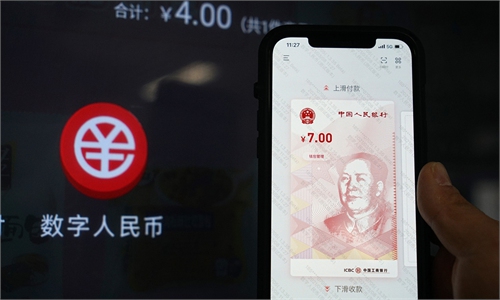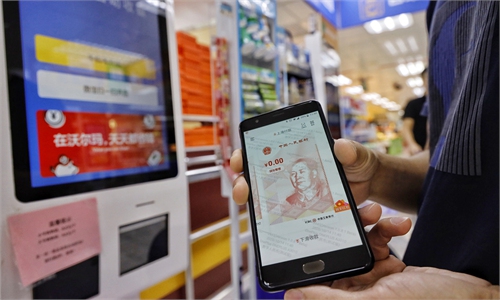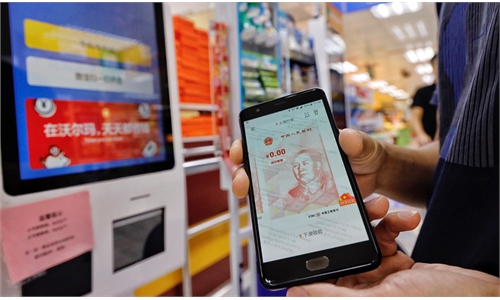Digital yuan will boost real economy via consumption with more application scenarios in China
Potential to boost real economy via consumption

China's central bank and the municipal government of Suzhou help JD.com test the digital currency for online shopping in December 2020. Photo: Courtesy of JD.com
The scope of the use of the digital yuan will be further expanded during this year's May 5 Shopping Festival, which will kick off on Saturday. With digital yuan red envelopes, or consumption coupons, that will be handed out to consumers, analysts say digital yuan will help boost the real economy through growth in consumption.
East China's Suzhou and Shanghai will give out red envelopes to consumers during the upcoming shopping festival, further diversifying its versatility. At present, six banks that will run trial digital yuan have connected with merchants and will together launch promotional activities, according to notices released by the commerce bureau of Shanghai municipality and Suzhou government last week.
Nearly 50 Carrefour stores in Shanghai, Suzhou and other neighboring cities will fully launch the digital yuan payment trial runs during the upcoming second May 5 Shopping Festival, Carrefour told the Global Times on Wednesday.
Meanwhile, more digital yuan pilot uses will be carried out in several core business districts in Beijing, in a bid to accelerate the digital environment building for the 2022 Winter Olympic Games, announced Financial Supervision Administration of Beijing on Wednesday.
"Digital currency in China currently combines the form of red envelopes with consumption festivals. Red envelopes can promote consumption, which can indirectly promote the real economy," Wang Peng, assistant professor of the Gaoling School of Artificial Intelligence at Renmin University of China, told the Global Times on Thursday.
And new application terminal forms like bracelets will also arouse curiosity. Thus, more people will be willing to try the digital yuan, which will boost consumption, said Wang.
In the just-ended 4th Digital China Summit, various forms of digital yuan wallet products debuted to the public. For example, watches, wristbands, walking sticks for the elderly and blind timers can make payment with digital yuan by touching an induction zone even without internet access.
"Unlike Alipay and WeChat wallet, the digital yuan can be used without internet network. It is very convenient. However, at the moment there are limited stores that can accept digital yuan payment, which I hope will change in the future," He Jian, a Shanghai resident, told the Global Times on Thursday.
A fruit vendor in Shanghai said that the use of digital yuan will definitely become a trend.
"It has been half a month since my store opened digital yuan payment. Some consumers come to me specifically to experience the use of digital yuan. I think the advantage is that there is no charge for withdrawal, and you can transfer it directly to bank cards," the vendor told Global Times on Thursday.
In the long term, after digital currency participates in economic operation, it will generate new payment methods and industrial chains, thus driving the economy. In addition to the payment and savings functions, the country can realize the supervision of anti-money laundering and anti-monopoly through digital currency, Wang added.
"The pilot has been a success so far, and there is no timetable for national rollout," said Li Bo, deputy governor of People's Bank of China (PBC), on April 18 at the Boao Forum.
Li added that more trial runs will be carried out in more cities and the release of relevant laws and supervision mechanism is necessary before the national rollout.
Wang also said that in order to realize early large-scale application, the pilot scope should be expanded and functions other than payment should be tested. At present, the trials are limited to personal consumption, that is, the payment function. The financial function should go on trial as early as possible. But this requires coordination between enterprises and various parts.
The combination of digital currency and industries driven by digital economy has many advantages, both of which are the result of digital upgrading and transformation of traditional industries, said Wang.



